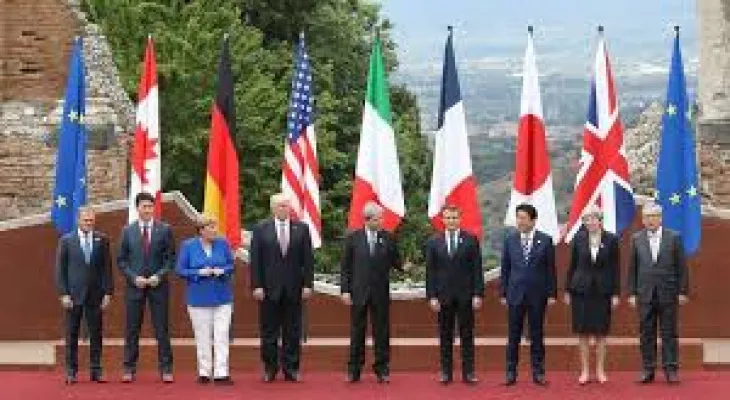Search here
Newspaper
Search here

Arab Canada News
News

Published: June 9, 2024
When U.S. President Joe Biden announced a new proposal for a ceasefire in the conflict between Israel and Hamas in Gaza last week, it took only a few days for the G7 to endorse the plan in a joint statement.
But experts say that other disagreements among G7 member countries over the past nine months could mean that the world’s leading economies will fail to reach a consensus on a long-term path to peace when they meet in Italy next week.
The G7 countries – Canada, the United States, Japan, France, Germany, Italy, and the United Kingdom, with the participation of the European Union as well – issued a statement on Monday saying they “fully support and will stand behind the comprehensive peace agreement defined by the President.” Biden said it would lead to an immediate ceasefire in Gaza, the release of all hostages, a significant and sustained increase in humanitarian aid to be distributed throughout Gaza, and a permanent end to the crisis.
The statement also reiterated the G7's commitment to ultimately a two-state solution and called on Hamas to accept the deal.
This ceasefire proposal would lead to the withdrawal of Israeli forces from populated areas in Gaza, the release of hundreds of Palestinians from captivity, allowing Palestinian families to return to their homes, and increasing food aid delivery to 600 trucks a day.
The ceasefire is expected to last for six weeks and will also require Hamas to release all Israeli hostages.
The G7 is not fully united on other issues related to the conflict.
On May 20, the Prosecutor General of the International Criminal Court, Karim Khan, announced that he was seeking arrest warrants for Hamas leaders and Israeli Prime Minister Benjamin Netanyahu and his defense minister.
Biden's reaction was immediate. In a media statement, the White House described attempts to prosecute Israeli leaders as "outrageous," saying "there is no equivalence between Israel and Hamas."
Meanwhile, France announced that it "supports the International Criminal Court and its independence and the fight against impunity in all cases," while French Foreign Minister Stéphane Séjourné said that the simultaneous arrest warrants should not suggest "equivalence" between Israel and Hamas.
Canada stated that it supports the work of the International Criminal Court. When asked whether the government would arrest Netanyahu under an arrest warrant from the court if he visited Canada, Foreign Minister Mélanie Joly said that the scenario is "hypothetical" and declined to answer.
John Kirton, director of the G7 Research Group at the University of Toronto, said that it is unlikely that G7 leaders will reach consensus on the details of a post-war future at their summit scheduled for June 13-15.
He added, "I think they know they can’t do that. I think what they want to spend their scarce time on in Polia is how to convince Hamas to drop ... its reservations about Biden's proposal."
Domestic and European divisions also play a role
Kirton also noted that domestic political considerations will be a factor for some leaders in the G7 – like Biden, who is seeking re-election against Donald Trump later this year, and Prime Minister Justin Trudeau, who is looking to retain the liberal stronghold in Toronto in the by-election on June 24.
He said, "All G7 leaders are not very popular at home." "We Canadians, I think in downtown Toronto, are thinking about the Liberal Party’s need to secure strong support from all the Jewish religious group citizens living in the St. Paul area."
Max Bergmann, director for Europe, Russia, and Eurasia at the Center for Strategic and International Studies, told reporters at a press conference on June 3 that he does not expect the Middle East conflict to feature prominently on the summit agenda.
Bergmann said, "The Europeans themselves do not have a unified stance on how to deal with the conflict."
He added, "There are countries like Germany, for example, that have long supported Israel. And there are other countries like Spain that have recognized the Palestinian state."
Spain does not have special membership in the G7 but will be represented at the summit through the European Union. Spanish Prime Minister Pedro Sánchez warned that Israel is heading towards international isolation.
However, one expert noted the harsher tone Biden used regarding Netanyahu in a recent interview with Time magazine before the ceasefire proposal but published days after his announcement.
Errol Mendes, a professor of international law at the University of Ottawa, said, "Ironically, there may be greater consensus among the G7 about what should happen now."
When asked during that interview whether he believed Netanyahu was prolonging the war in Gaza for his own political reasons, Biden said, "There are every reason for people to reach that conclusion."
The official G7 website notes that the "main focus" of the upcoming summit "will be defending the rules-based international order. The aggressive war waged by Russia against Ukraine has undermined its principles and raised increasing instability, with multiple crises emerging around the world." "We will give equal importance to the conflict in the Middle East, with its implications for the global agenda."
Speaking to reporters on Friday, a Canadian government official said Prime Minister Trudeau will participate in a working session on the Middle East during the G7 summit.
The official did not specify what Canada hopes to achieve from the meeting. He said, "I won't speculate on what the leaders will agree upon while they are in Italy."
On Thursday, Joly posted on social media platform X that she spoke with her Jordanian and Saudi counterparts about Gaza, the "urgent need for a ceasefire," humanitarian aid, and the need to release Israeli hostages.
Meanwhile, U.S. Secretary of State Antony Blinken announced a quick trip to the Middle East including Egypt, Israel, Jordan, and Qatar in the days leading up to the G7 summit. A ceasefire proposal is expected to be discussed.
Comments